Regular health check-ups are crucial for early disease detection, sustained wellness, and preventive healthcare. In the UAE, where fast-paced lifestyles and chronic conditions like diabetes and heart disease are prevalent, prioritizing systematic health assessments has become essential. Health screenings, including blood tests, imaging procedures, and personalized risk evaluations, empower individuals to detect potential issues early and manage their long-term well-being. According to the World Health Organization, early detection can lower the risk of severe illness by up to 40%.
In line with these global standards, UAE authorities such as the Ministry of Health and Prevention (MOHAP), Dubai Health Authority (DHA), and Abu Dhabi Health Services Company (SEHA) are driving a strong national focus on preventive care. Initiatives like DHA’s Smart Clinics, MOHAP’s nationwide screening programs, and SEHA’s integrated care networks reflect a commitment to making preventive healthcare a public health priority.
Additionally, digital health platforms such as Malaffi, Riayati, and the Al Hosn App strengthen access to unified medical records, ensuring efficient, proactive care. As Dr. Fatma Al Olama and Dr. Farida Al Hosani emphasize, preventive health check-ups are foundational to living longer, healthier lives and achieving the UAE Vision 2030 goals of innovation-driven public health excellence.
In this guide, we explore the importance of regular health check-ups in the UAE and how they align with the nation’s broader healthcare strategies.
Benefits of Regular Health Check-Ups
Regular health check-ups are a foundational element of preventive healthcare, designed to detect potential health issues before they become serious concerns. In the UAE, where national health authorities such as MOHAP, DHA, and SEHA drive a proactive wellness agenda, regular screenings are more accessible and encouraged than ever. Supported by innovations like the Riayati health information platform and aligned with UAE Vision 2030 goals, these check-ups not only safeguard individual health but also strengthen the overall resilience of the healthcare system. By committing to routine evaluations, residents can enjoy greater peace of mind, longer life expectancy, and substantial cost savings—key benefits that shape a healthier, stronger future for the nation.
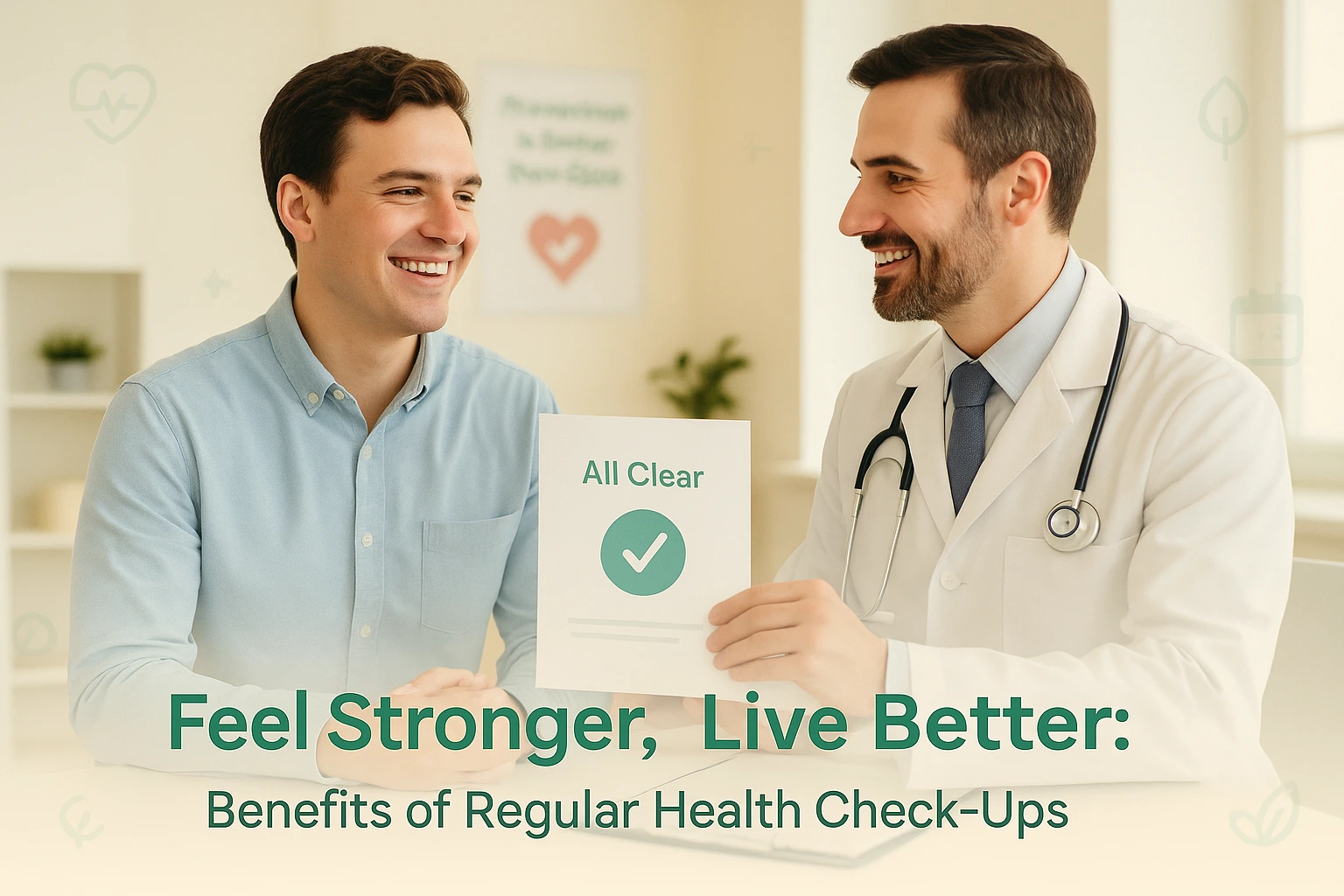
Early Detection of Health Conditions
Early detection refers to identifying health conditions before noticeable symptoms emerge, enabling timely intervention when treatment is most effective. According to the World Health Organization (WHO), early-stage diagnosis can increase survival rates by up to 90%, especially for conditions like cancer, compared to detection at advanced stages.
In the UAE, early detection is a national health priority. The Ministry of Health and Prevention (MOHAP) leads robust initiatives encouraging routine screenings to catch high-risk conditions such as diabetes, cancer, and hypertension before they escalate. Complementing these efforts, the Dubai Health Authority (DHA) operates Smart Clinics designed to streamline screening access across the city, while Abu Dhabi Health Services Company (SEHA) delivers community-centered programs ensuring broad preventive care coverage throughout the emirate. Together, these strategies embed early detection as a standard of care across the Emirates.
Key early detection services include diagnostic screenings (e.g., mammograms, blood tests), genetic testing for hereditary risks, and comprehensive health risk assessments. The effectiveness of these programs is measured by reductions in late-stage disease incidence and improved treatment success rates. As Dr. Fatma Al Attar, Director of International Health Regulations at MOHAP, highlights, “Screenings are a fundamental tool in reducing the national disease burden and extending healthy life expectancy.”
Cost Savings Through Preventive Measures
Preventive healthcare refers to actions taken to prevent disease rather than treating it after onset. Studies from the Centers for Disease Control and Prevention (CDC) show that preventive services can save up to $7 billion annually in healthcare costs. In the UAE, this approach resonates strongly with Vision 2030’s emphasis on a sustainable, high-quality healthcare system. Regular check-ups reduce the financial toll of chronic and late-stage disease management, translating into long-term savings for individuals and the national healthcare infrastructure. Digital platforms like Riayati, which consolidate patient records across all emirates, play a pivotal role by facilitating early interventions and cutting down on unnecessary hospitalizations.
Types of preventive measures include vaccinations, routine physical exams, and lifestyle counseling. Purpose is measured through reduced healthcare costs and improved population health metrics. “An ounce of prevention is worth a pound of cure,” states Dr. Farida Al Hosani, Executive Director of Infectious Diseases at SEHA. UAE’s integration of smart health technologies ensures that preventive healthcare is not only cost-effective but also accessible to every resident.
Enhancing Life Expectancy and Overall Wellness
Life expectancy enhancement is defined as prolonging the average lifespan through medical, lifestyle, and preventive strategies. Recent UAE health data indicates that proactive healthcare initiatives have contributed to a steady rise in national life expectancy, now averaging around 78 years. Routine screenings help uncover health risks early, empowering individuals to take meaningful, preventative actions. Continuous monitoring supports informed lifestyle changes—such as improved diet, exercise, and stress management—that collectively boost long-term wellness.
MOHAP’s public awareness campaigns, backed by DHA and SEHA initiatives, regularly highlight the link between regular health check-ups and national well-being. This focus aligns perfectly with Vision 2030’s mission to nurture a healthier, more resilient UAE society. Efficiency in life expectancy programs is evaluated through national health surveys and morbidity statistics.
“Regular health assessments serve as a personal investment in future quality of life,” explains Dr. Mariam Al Mutawa, Chief Nursing Officer at SEHA.
Strengthening Mental Health Through Preventive Care
Mental health reinforcement through preventive care is defined as promoting psychological well-being by ensuring continuous health surveillance and early stressor identification. Mental Health America (MHA) research highlights that individuals engaging in regular health check-ups report 25% lower levels of anxiety. In the UAE, this principle is increasingly integrated into healthcare models. DHA’s Smart Clinics and SEHA’s screening centers focus not only on physical health but also on offering reassurance and early mental health support.
Types of mental health support through check-ups include anxiety screenings, counseling referrals, and holistic patient engagement. Purpose and efficiency are tracked through mental health surveys and reduced incidence of severe psychological disorders. Digital ecosystems like Riayati empower residents by providing instant access to their health profiles, fostering a greater sense of control, calm, and connection to their personal health journeys.
Dr. Amer Sharif, CEO of Dubai Academic Health Corporation, affirms, “Empowering individuals through access to their health data strengthens both mental and physical resilience, which are key pillars of a healthy society.” This holistic approach is a vital component of UAE’s broader vision for integrated preventive care by 2030.
Common Health Check-Up Packages in UAE Clinics
Choosing the right health check-up package is an essential step in maintaining long-term wellness. Across the UAE, leading healthcare providers—including MOHAP, DHA, and SEHA-affiliated clinics—offer a wide range of comprehensive health screening packages tailored to different age groups, risk profiles, and lifestyle needs. Whether through basic preventive screenings or advanced executive health assessments, residents can easily access customized solutions that align with UAE Vision 2030’s focus on proactive healthcare. Understanding the most common check-up options available today helps individuals take greater control of their health journey, supported by innovations like the Riayati platform and the nation’s growing network of smart healthcare services.
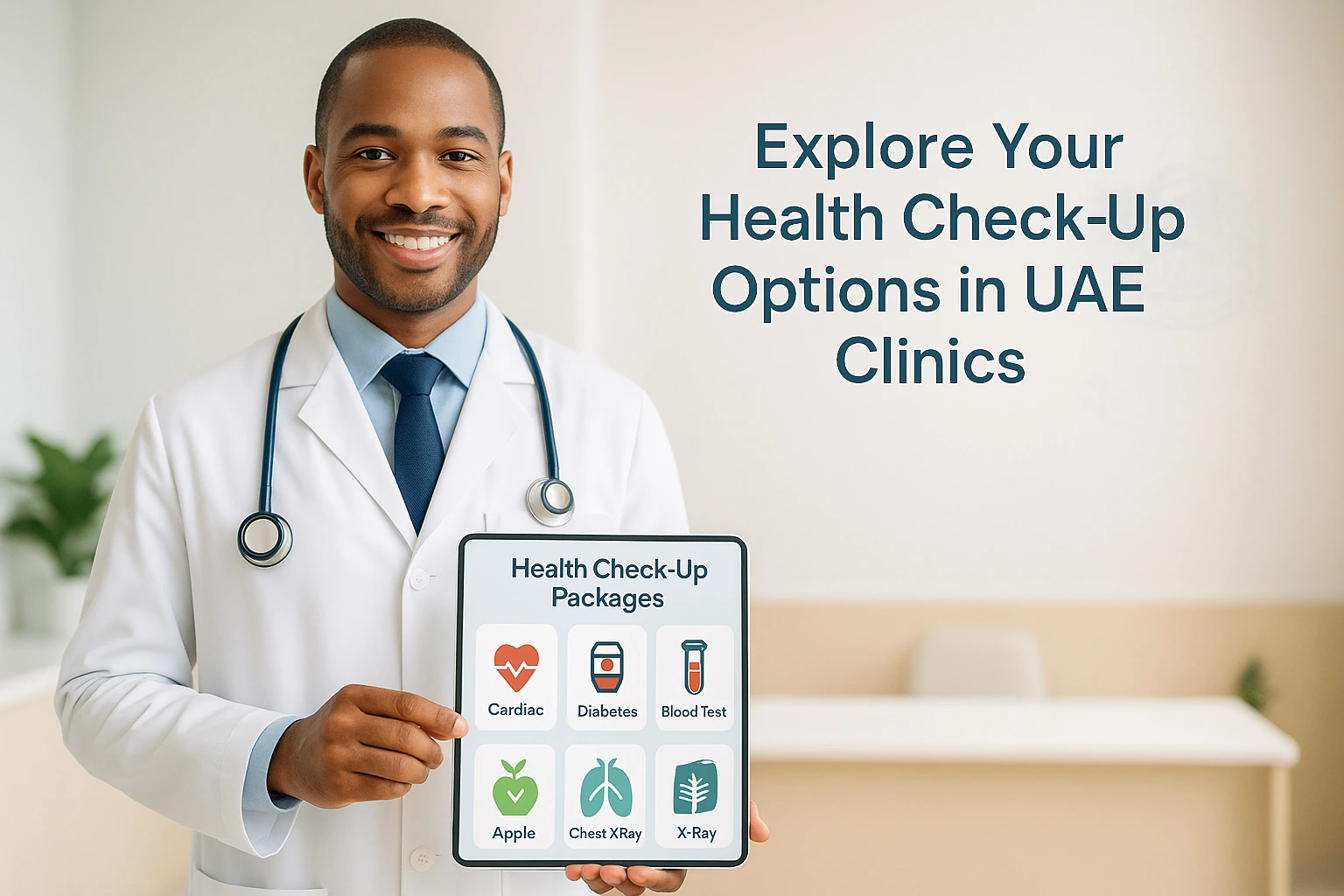
General Health Screenings in UAE Clinics: Building a Strong Foundation for Wellness
General health screenings are defined as broad-based medical evaluations designed to establish a snapshot of an individual’s overall health. These essential packages, offered by clinics across the UAE, typically include blood tests, urine analyses, chest X-rays, and detailed physical examinations. Together, they create a crucial health baseline for proactive monitoring and management. Clinics often personalize screenings based on age, gender, and specific risk factors, ensuring that care remains tailored and relevant. To uphold quality and consistency, the Ministry of Health and Prevention (MOHAP) rigorously regulates these services across the country. Whether visiting Aster Hospitals, Mediclinic Middle East, or Emirates Hospitals Group, residents and expatriates can expect high-standard, customized general health packages that support early detection and promote lifelong wellness.
Specialized Medical Packages in UAE: Targeted Cardiac, Diabetes, and Cancer Screenings
Specialized health packages are defined as focused diagnostic services aimed at early detection and management of high-risk medical conditions. For those needing deeper evaluations, UAE healthcare providers offer targeted packages addressing major health concerns such as heart disease, diabetes, and cancer. The Dubai Health Authority (DHA) champions these preventive efforts through programs like Dubai Smart Clinics, which expand community access to specialized care. Esteemed institutions across the Emirates lead these initiatives: Cleveland Clinic Abu Dhabi delivers cutting-edge cardiac screenings, Mediclinic Middle East offers robust diabetes management and screening programs, and Emirates Hospitals Group specializes in early cancer detection services. By offering in-depth diagnostic insights, these packages empower patients to take control of their health outcomes through timely, preventive action.
Visa Medical Tests and Employer-Mandated Health Screenings in UAE
Visa medical tests and employer screenings are defined as compulsory health evaluations required by UAE regulations to ensure public safety and workforce well-being. As a critical part of residency and employment processes, all new visa applicants must undergo infectious disease screenings, including tests for HIV, tuberculosis, and hepatitis, as mandated by MOHAP. In Abu Dhabi, SEHA Clinics oversee occupational health assessments, ensuring that private and public sector employees meet health compliance standards. Facilities such as Burjeel Hospital and Aster Hospitals streamline access to visa-related medical testing, making the process efficient for expatriates and employers alike. Moreover, periodic health checks are required for employees in certain industries under UAE Labor Law, with DHA’s Medical Fitness Centers throughout Dubai supporting these mandatory evaluations. This structured system exemplifies the UAE’s steadfast commitment to sustaining a healthy, productive population.
Recommended Check-Up Frequency by Age and Health Status
Staying proactive about your health starts with knowing how often to schedule important check-ups. Preventive healthcare is not one-size-fits-all—your age, health status, and lifestyle all influence the screenings you need and when you need them. In the UAE, healthcare authorities like MOHAP, DHA, and SEHA recommend tailored health check-up schedules to support early detection, disease prevention, and long-term wellness. Below, we break down the recommended check-up frequency by age group, helping you take charge of your health at every life stage.
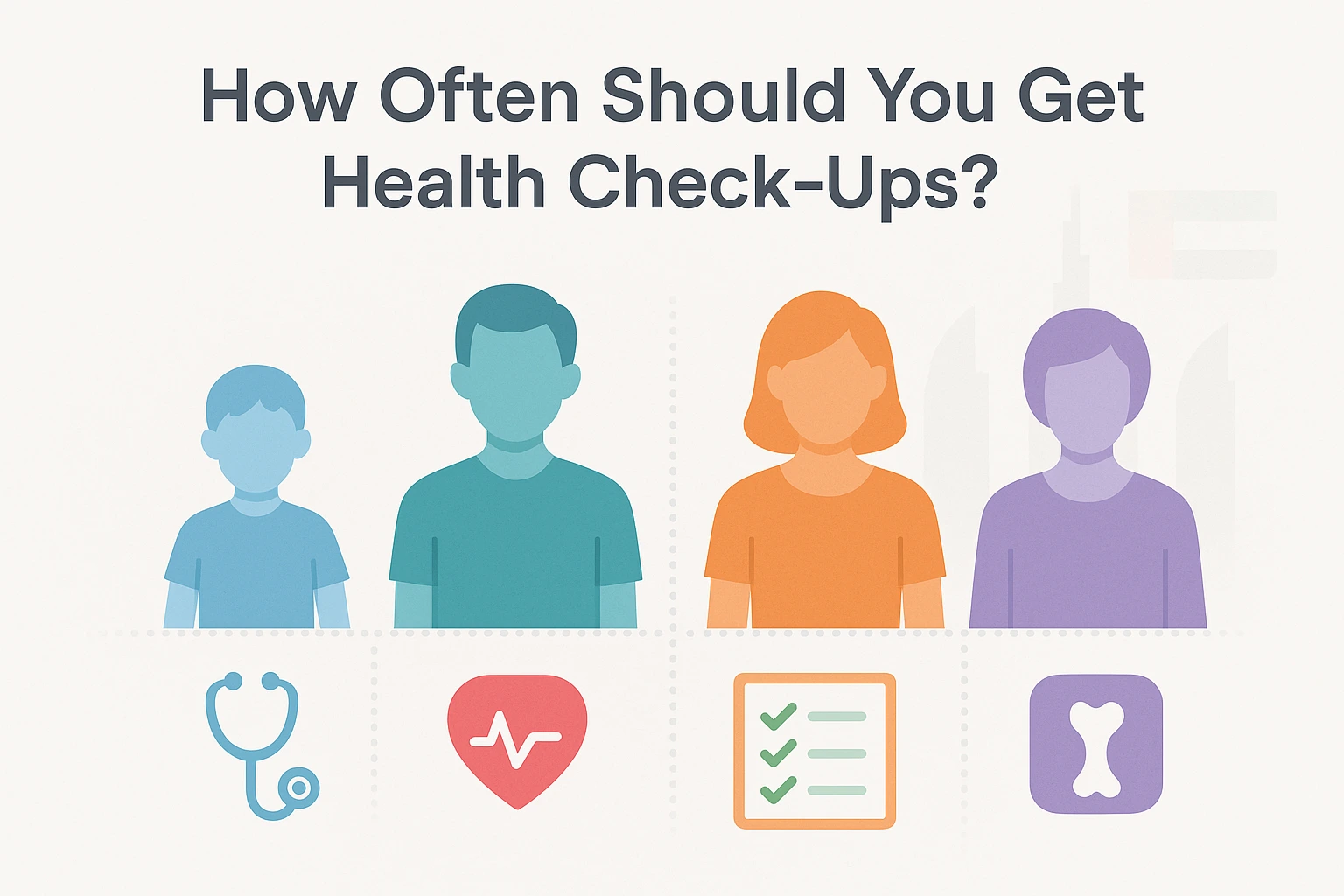
Adults (18–39 Years): Essential Annual Tests
- Physical Examination: Assessment of vital signs, BMI, and overall health status.
- Blood Pressure Screening: Every two years; annually if elevated or at risk.
- Cholesterol Check: Every 4–6 years; more frequently if family history is present.
- Blood Glucose Test: Every 3 years starting at age 30; earlier if overweight or genetically predisposed.
- Sexually Transmitted Infections (STIs) Screening: Based on personal risk factors.
- Mental Health Evaluation: Periodic assessments for stress, anxiety, and depression.
- Vaccination Updates: Ensure immunizations like HPV, hepatitis B, and influenza are current.
- Cervical Cancer Screening: Pap smear tests for women starting at age 21, repeated every 3 years.
In the UAE, healthcare authorities like MOHAP and DHA emphasize early detection, lifestyle counseling, and vaccination updates for young adults to establish a foundation of lifelong health. Regular check-ups during this stage prevent silent chronic conditions and promote sustained wellness.
Middle-Aged Adults (40–59 Years): Focused Screening Needs
- Cardiovascular Assessment: Routine ECGs, lipid profiles, and cardiac stress tests.
- Diabetes Screening: Annual HbA1c testing, particularly for those with elevated BMI or family history.
- Colorectal Cancer Screening: Begin regular screening from age 45.
- Breast Cancer Screening: Mammograms every 1–2 years for women starting at age 40.
- Prostate Cancer Screening: PSA testing for men starting at age 50, or earlier if risk factors are present.
- Eye and Hearing Tests: Every 2–4 years to monitor age-related changes.
- Bone Density Test: For women over 50 and men over 60, or earlier based on risk.
- Mental Health Screening: Regular evaluations for signs of depression and anxiety.
SEHA and DHA promote structured screening programs for middle-aged adults to detect and manage conditions early. Cardiovascular, metabolic, and cancer screenings during this period are vital to reducing the burden of non-communicable diseases and ensuring healthy aging.
Senior Citizens (60+ Years): Comprehensive Health Assessments
- Annual Physical Exam: Including cognitive function and frailty assessments.
- Cardiovascular and Diabetes Monitoring: Continued management and early complication detection.
- Continued Cancer Screenings: Based on individual health history and physician guidance.
- Vision and Hearing Tests: Annual evaluations to support quality of life.
- Bone Health Assessments: Regular bone density scans to monitor osteoporosis risks.
- Vaccination Updates: Annual influenza vaccine, pneumococcal vaccine, and shingles vaccine post-60.
- Cognitive Health Evaluation: Early screening for dementia, Alzheimer’s disease, and memory loss.
- Mental Health Screening: Depression screening to support emotional well-being.
MOHAP’s initiatives focus heavily on enhancing geriatric preventive care in the UAE, aiming to help seniors maintain independence, mobility, and overall life satisfaction. Regular comprehensive assessments are critical to catching age-related conditions early and managing them proactively.
| Age Group | Key Screenings | Key Tests | Recommended Frequency |
|---|---|---|---|
| 18–39 Years | General Health Maintenance | BP, Cholesterol, Blood Sugar, STI Screening, Mental Health Check | Annually or based on risk |
| 40–59 Years | Chronic Disease Prevention | ECG, HbA1c, Colonoscopy, Mammogram, PSA, Bone Density | Annually or Bi-annually |
| 60+ Years | Comprehensive Geriatric Health | Full Physical, Cognitive Test, Cancer Monitoring, Vaccination Updates | Annually |
Choosing the Right Healthcare Provider in the UAE
Choosing a healthcare provider is defined as the process of evaluating and selecting medical institutions that meet specific standards of quality, accreditation, and patient-centered care. In the UAE, making an informed choice is crucial to receiving high-quality preventive services that align with the country’s rigorous healthcare regulations. Regulatory authorities such as the Dubai Health Authority (DHA) and the Department of Health Abu Dhabi (DOH) enforce strict licensing requirements and operational standards to ensure patient safety and medical excellence.
Whether opting for a public hospital, a private clinic, or a telehealth provider, evaluating factors like accreditation status, specialty services, insurance compatibility, second opinion availability, and patient reviews plays a key role in securing trusted, effective care. As Dr. Haider Al Yousuf, a noted UAE health policy expert, states, “Choosing an accredited provider is not just about preference; it is about ensuring your health outcomes meet global best practices.”
In recent years, telehealth services have also emerged as a significant consideration. Many accredited UAE healthcare providers now offer secure virtual consultations, providing patients faster access to medical advice without needing a physical visit.
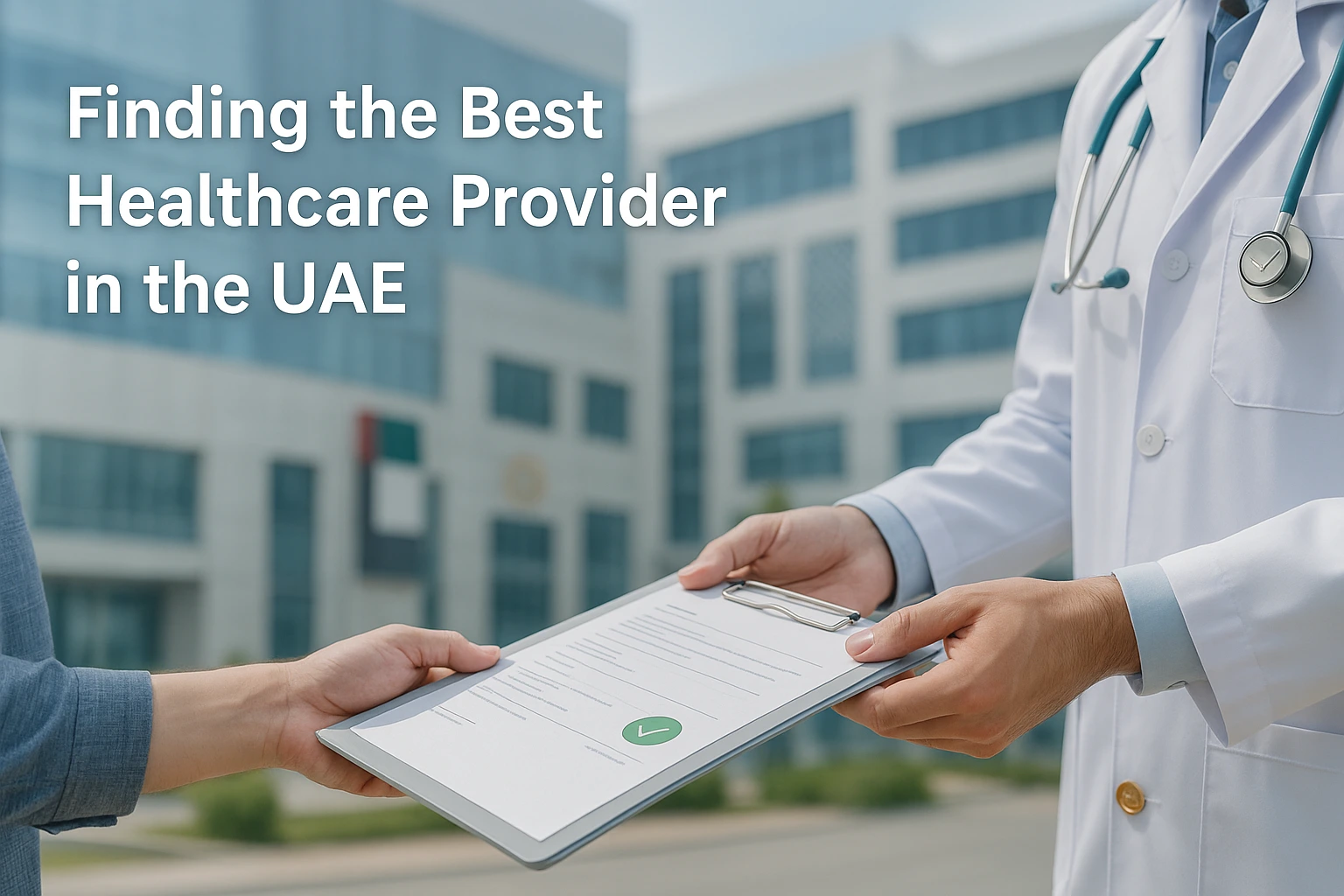
Top Hospitals and Clinics for Routine Screenings in the UAE
Routine health screenings are defined as regular preventive evaluations designed to detect early signs of disease and maintain overall health. Across the UAE, an extensive network of accredited healthcare institutions offers customized screening packages for residents, expatriates, and medical tourists alike, including:
- Cleveland Clinic Abu Dhabi – Renowned for its advanced preventive programs, particularly in cardiovascular health, cancer detection, and providing second-opinion services.
- Mediclinic Middle East – Offers a comprehensive range of screening services across Dubai and Abu Dhabi, focusing on early diagnosis, holistic wellness management, and chronic disease prevention.
- Burjeel Hospitals – Specializes in executive health assessments, chronic disease screenings, and rehabilitation programs for post-treatment care.
- Emirates Hospitals Group – Delivers tailored preventive care services with a strong emphasis on early diagnosis, post-care support, and health promotion.
Each facility operates under stringent standards set by the DHA, DOH, and internationally recognized organizations like the Joint Commission International (JCI), ensuring world-class quality in preventive healthcare.
Additionally, the UAE is recognized as a global hub for medical tourism, attracting patients seeking top-tier preventive and specialized treatments.
How to Verify DHA and DOH Healthcare Accreditation?
Healthcare accreditation is defined as formal recognition by a recognized body that a healthcare organization meets predetermined performance standards. Verifying a provider’s accreditation status is a vital step to ensure your chosen facility upholds UAE’s healthcare benchmarks. Here’s how you can easily confirm a facility’s credentials:
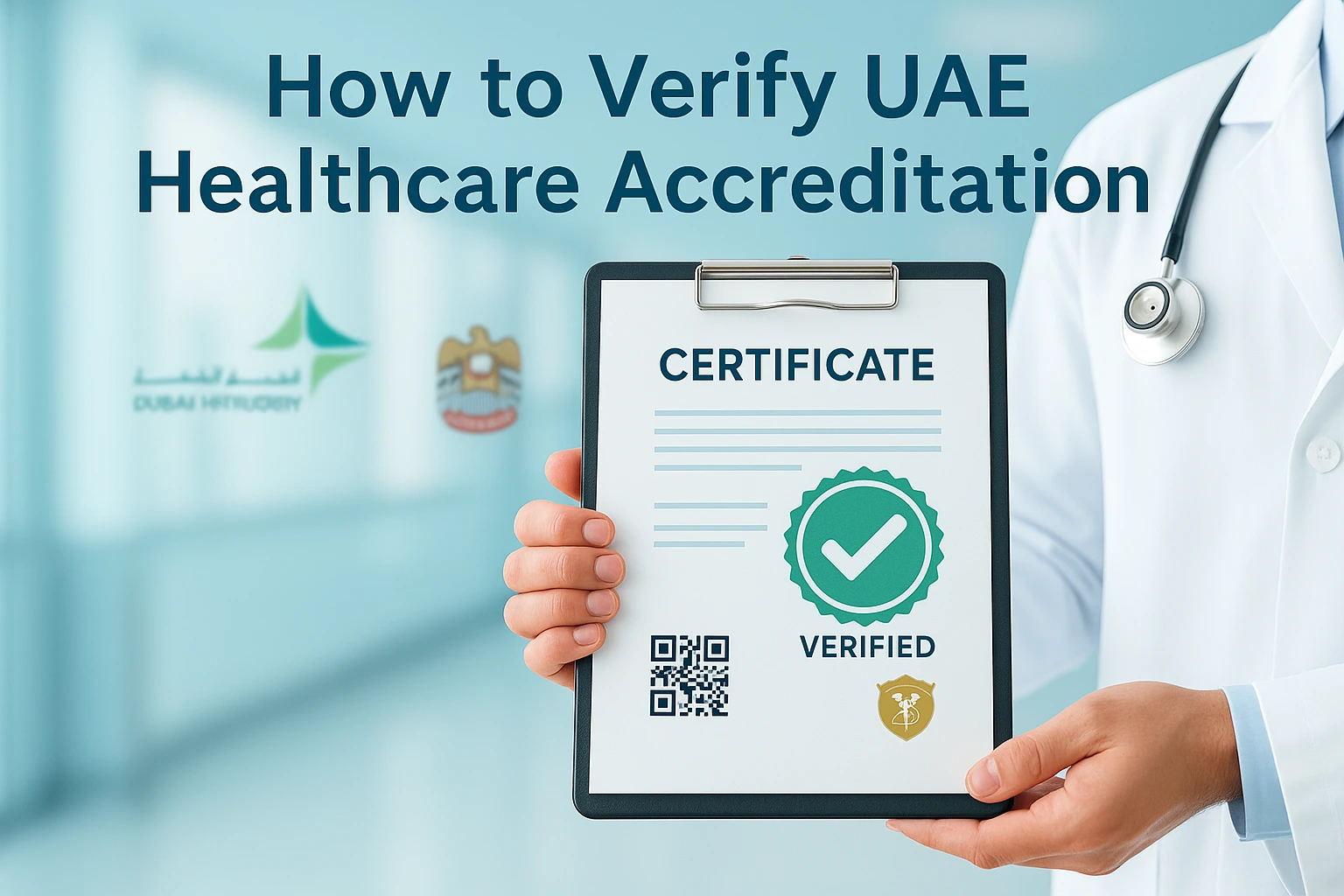
Access Official Portals:
- For Dubai-based providers, use the DHA Facility Search Portal.
- For Abu Dhabi providers, visit the DOH eServices Portal.
Search for the Facility:
- Enter the name or license number of the hospital, clinic, or diagnostic center to find official registration details.
Review License and Accreditation Status:
- Confirm that the facility maintains a valid DHA or DOH license.
- Look for additional certifications like Joint Commission International (JCI), which indicates compliance with global healthcare quality standards.
Verify Specializations:
- Ensure the provider is authorized to perform preventive health services, diagnostic screenings, second opinion consultations, telemedicine, or specialized chronic disease management.
By following these steps, patients can confidently select trusted providers that meet both national and international healthcare quality standards.
Private Clinics vs Public Health Facilities in the UAE: Pros and Cons
Private and public healthcare services are defined as two distinct healthcare delivery models offering different benefits regarding cost, access, specialization, and insurance acceptance.
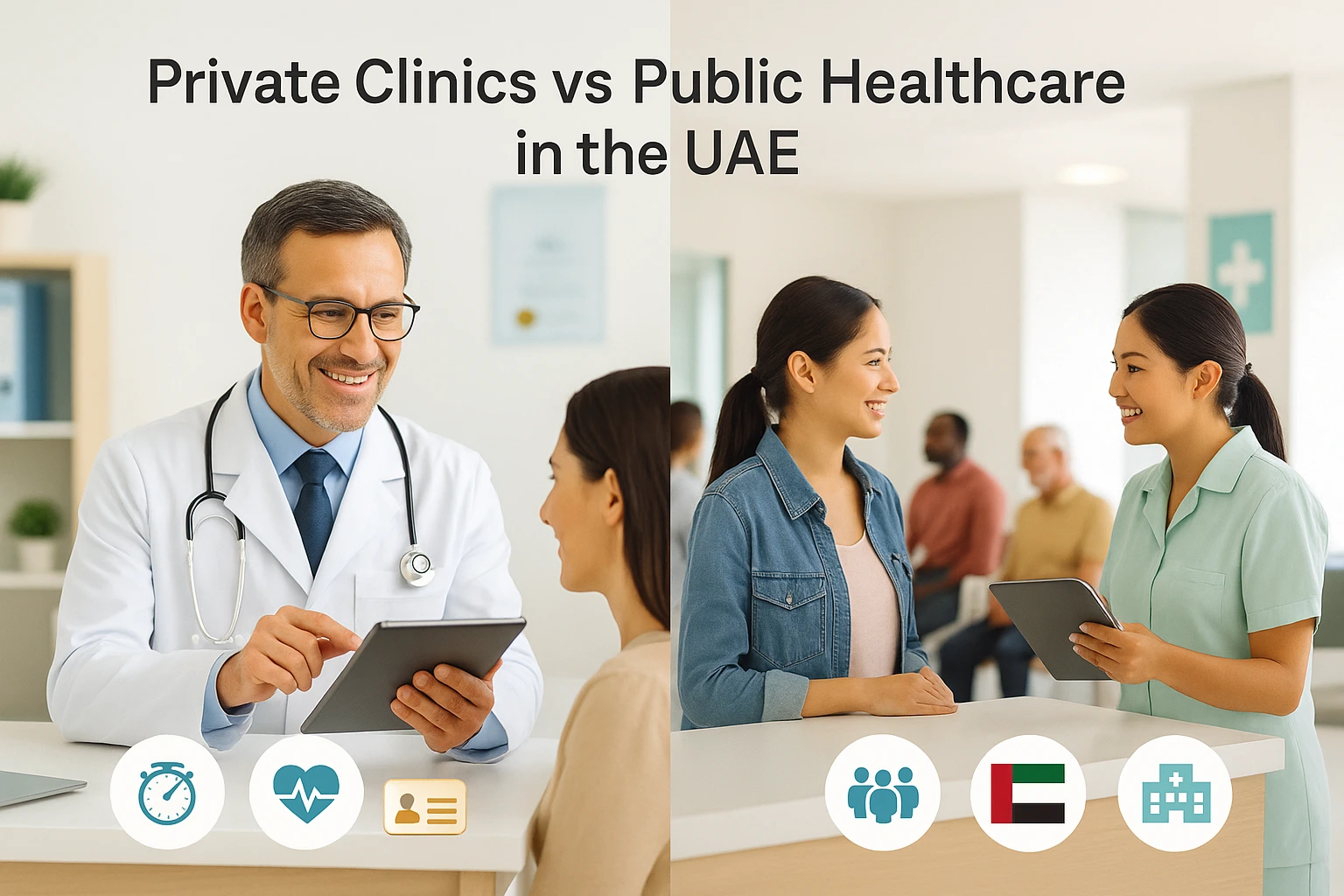
Choosing between them often depends on your individual healthcare needs, insurance coverage, and budget. Here’s a comparative overview:
| Feature | Private Clinics | Public Health Facilities |
|---|---|---|
| Access Speed | Faster appointments, extended hours | Longer wait times for non-emergency services |
| Cost | Higher out-of-pocket costs, often covered by private insurance | Subsidized or free for UAE nationals; higher costs for uninsured expatriates |
| Specialization | Advanced specialty services, telehealth, second opinions, cutting-edge technologies | Standardized care focusing on general medicine and public healthcare specialties |
| Insurance Coverage | Broad acceptance of private insurance networks | Limited partnerships with private insurance providers |
| Medical Tourism Appeal | High (attracts international patients for specialized services) | Moderate (focus on citizens and residents) |
| Post-Treatment Support | Available through rehabilitation and chronic care management programs | Limited to core services, referrals required for extended care |
Private clinics generally appeal to individuals seeking rapid, specialized services with flexible scheduling and personalized preventive health programs, whereas public facilities are particularly advantageous for UAE nationals seeking comprehensive, government-supported care. Both sectors are integral to the UAE’s healthcare ecosystem, providing high-quality services within their respective frameworks.
Insurance Coverage and Health Check-Ups
Preventive healthcare is a major focus in the UAE, with both public and private insurance providers offering varying degrees of coverage for routine health check-ups. Thanks to government initiatives and digital innovations like Malaffi and Riayati, accessing preventive services is now more seamless and protected than ever before. Understanding your insurance benefits, Emirates ID integration, and cost options can help you make smarter, more affordable health decisions.
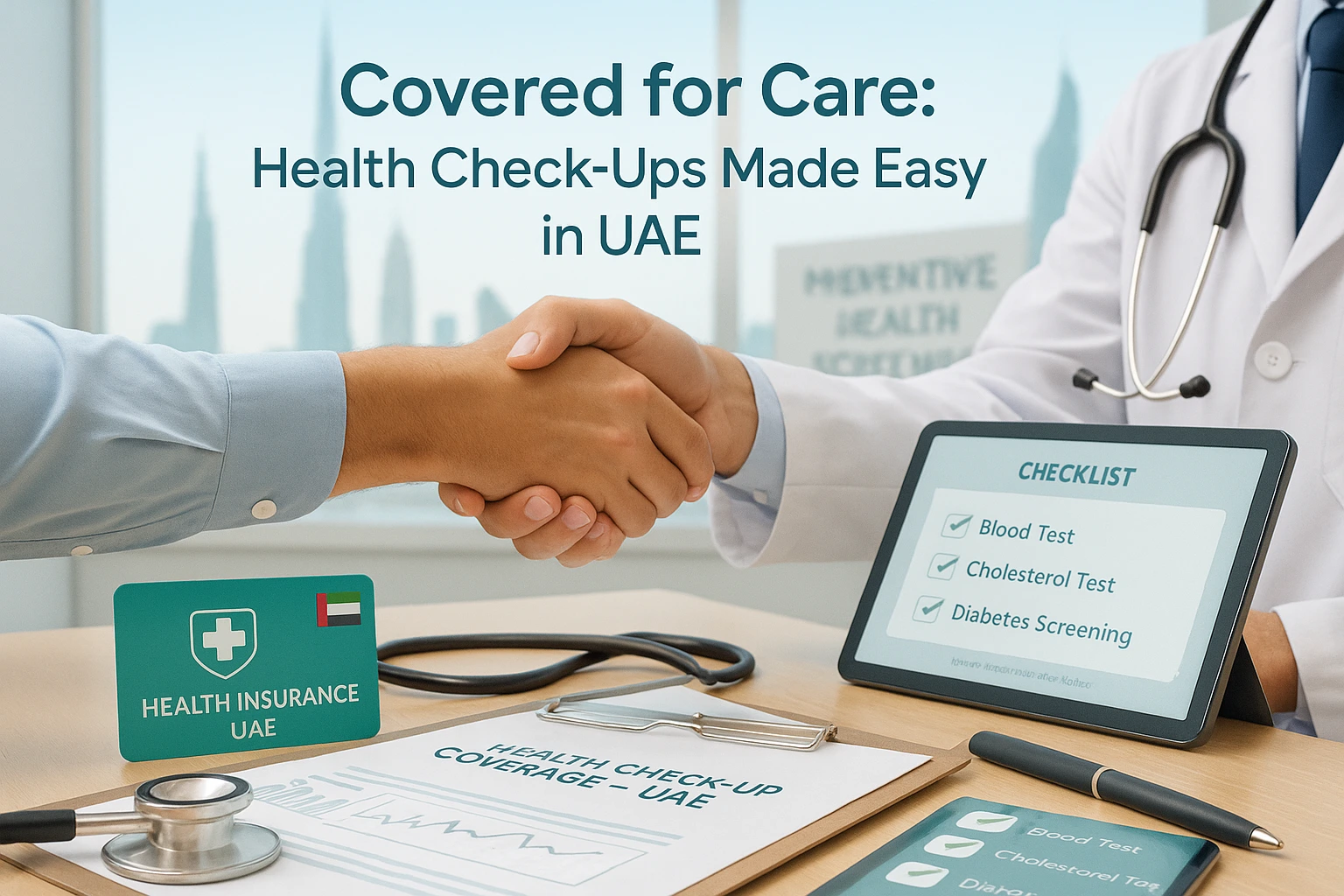
Are Health Check-Ups Covered by UAE Medical Insurance?
Most UAE medical insurance plans — from the Essential Benefits Plan (EBP) to private comprehensive policies — include preventive health screenings to some extent:
- Essential Benefits Plan (EBP): Covers basic preventive services like diabetes screening (every three years for adults over 30) and cancer screenings under the Basmah initiative for eligible individuals.
- Private Insurance Plans: Often provide full coverage for annual wellness check-ups, vaccinations, and condition-specific screenings when using in-network providers.
- Corporate Health Plans: Employer-provided insurance may include extended preventive services as part of employee wellness programs.
It’s always recommended to confirm coverage limits, pre-authorization requirements, and any co-payment obligations with your insurer or HR department before scheduling check-ups.
Emirates ID Integration and Medical Records Accessibility
Emirates ID now plays a crucial role in streamlining healthcare access across the UAE through national health information networks:
- Unified Health Records: Platforms like Malaffi (Abu Dhabi) and Riayati (nationwide) consolidate your health data, making your previous lab results, screenings, and vaccinations easily retrievable during new check-ups.
- Faster, Smarter Care: Doctors can access patient histories instantly, reducing redundant testing and improving diagnosis accuracy.
- Data Privacy: Patient data is protected under MOHAP’s Federal Law No. (2) of 2019, ensuring that all health information remains confidential and securely stored within UAE borders.
Out-of-Pocket Costs vs. Corporate Wellness Programs
Depending on your employment and insurance status, you may either pay out-of-pocket for health check-ups or access preventive care through corporate wellness benefits:
| Option | Pros | Cons |
|---|---|---|
| Out-of-Pocket Payments | Freedom to choose any provider without insurance restrictions | Higher personal costs, especially for comprehensive screenings |
| Corporate Wellness Programs | Lower or no additional cost; access to scheduled preventive check-ups | Limited provider networks; eligibility tied to employment status |
By carefully understanding your insurance policy, taking advantage of corporate wellness initiatives, and utilizing Emirates ID integration, UAE residents can maximize their preventive healthcare benefits while safeguarding personal health information.
Common Barriers to Regular Health Screenings
While the benefits of regular health screenings are well-documented, many individuals still face obstacles that prevent them from accessing timely preventive care. In the UAE, healthcare authorities such as MOHAP, DHA, and SEHA are actively working to address these challenges through public awareness campaigns, digital platforms like Riayati, and healthcare reforms aligned with Vision 2030. Understanding the most common barriers—whether logistical, financial, or psychological—is essential to improving national screening rates and empowering residents to take charge of their health. By identifying and overcoming these hurdles, the UAE moves closer to its vision of a healthier, more resilient society.
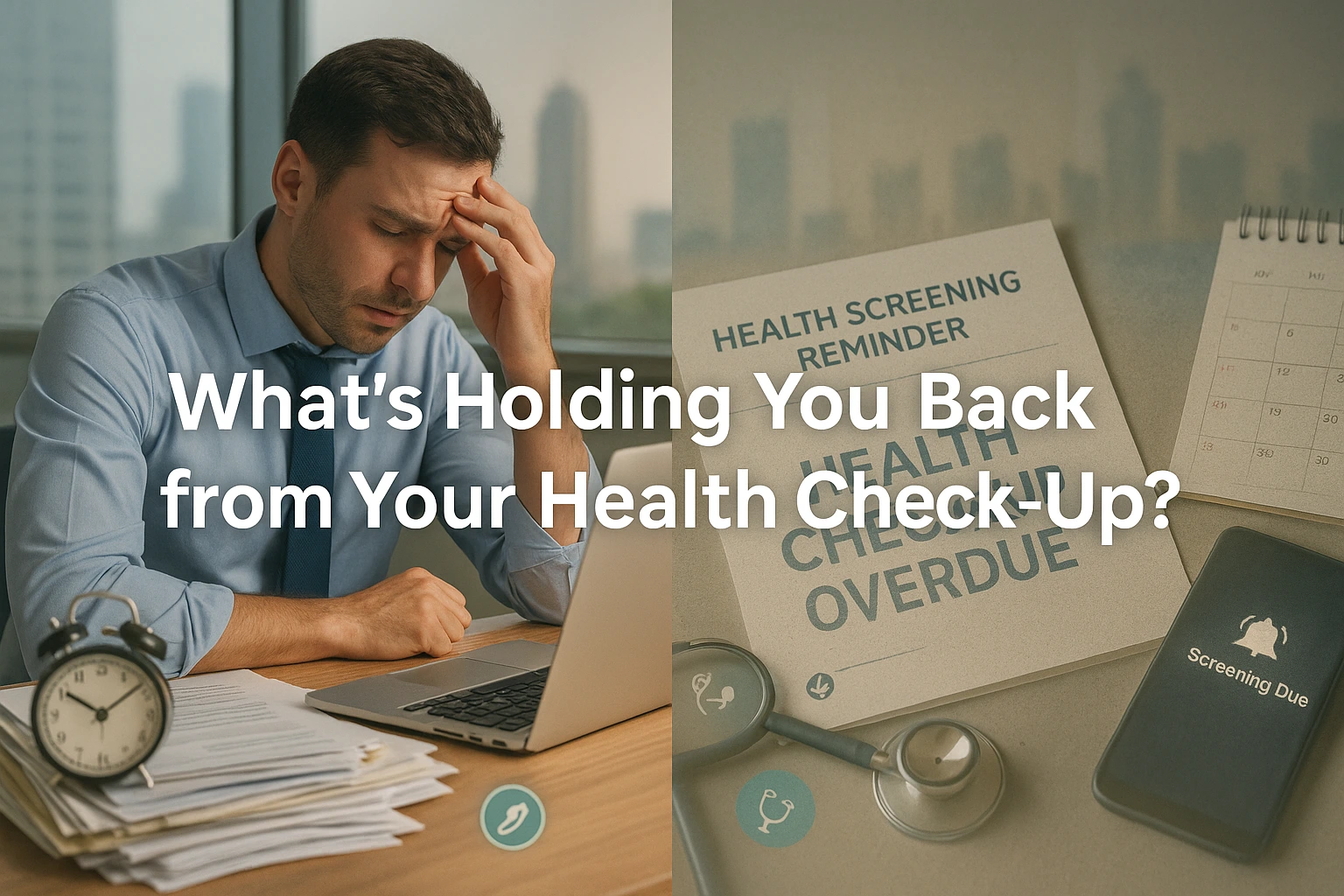
Lack of Awareness About Preventive Healthcare
Preventive healthcare is defined as medical strategies aimed at preventing illnesses before they develop, rather than treating conditions after symptoms appear. Despite robust public health efforts led by entities such as the Ministry of Health and Prevention (MOHAP), Dubai Health Authority (DHA), and SEHA (Abu Dhabi Health Services Company), a significant portion of the UAE population remains unaware of how vital preventive screenings are to long-term health.
Persistent misconceptions—such as the belief that screenings are only needed when symptoms arise—continue to hinder early detection efforts. According to a MOHAP study, early detection through regular screenings could prevent up to 60% of chronic disease complications. To shift these perceptions, healthcare organizations are intensifying education campaigns, framing regular check-ups as essential investments in future health rather than reactive measures.
Additionally, public awareness programs like the Pink Caravan Breast Cancer Initiative and World Health Day UAE campaigns are emphasizing the importance of preventive screenings across different demographics.
Busy Urban Lifestyles and Time Constraints
Urban lifestyle challenges are defined as the daily pressures and time limitations experienced by individuals living in densely populated, fast-moving cities. In hubs like Dubai and Abu Dhabi, demanding work schedules, family obligations, and fast-paced social lives often push preventive care to the bottom of the priority list.
This time scarcity leads to missed opportunities for early diagnosis and timely intervention. Recognizing this barrier, healthcare providers—including DHA’s Smart Clinics, SEHA’s preventive centers, and private operators like Mediclinic and Aster DM Healthcare—have introduced:
- Flexible scheduling options
- Weekend and evening appointments
- Mobile health units for on-site corporate screenings
- Telehealth services offering preventive consults via apps like DHA Doctor for You
These innovations are designed to help individuals seamlessly integrate health screenings into their busy lives without sacrificing convenience or quality of care.
Fear of Diagnosis and Medical Anxiety
Medical anxiety is defined as the emotional distress associated with medical evaluations and the potential discovery of serious health conditions. Fear remains a profound deterrent to proactive health screenings in the UAE. Many individuals avoid check-ups due to concerns about uncovering unfavorable diagnoses, even though early detection dramatically improves survival rates and reduces healthcare costs.
As Dr. Mariam Al Jalahma, a regional expert in preventive health, notes, “Framing screening as an empowering choice rather than a fearful one can transform public engagement with preventive care.”
To address these emotional barriers, healthcare systems like MOHAP, SEHA, and private mental health centers (e.g., American Center for Psychiatry and Neurology, Lighthouse Arabia) are:
- Emphasizing patient-centered communication
- Providing counseling support integrated with preventive check-up programs
- Offering educational initiatives that reframe screenings as opportunities for empowerment rather than sources of fear
Campaigns like Mental Health Awareness Month UAE further complement efforts to normalize medical discussions and reduce anxiety.
Perceived Costs and Insurance Limitations
Healthcare affordability barriers are defined as financial or insurance-related obstacles that deter individuals from accessing preventive medical services. Although many UAE insurance plans now cover preventive screenings, perceived high costs and actual gaps in coverage still dissuade many—especially uninsured expatriates—from seeking regular health evaluations.
According to Department of Health (DOH) Abu Dhabi statistics, financial concerns are among the top three reasons cited for delayed healthcare visits. Contributing factors include:
- Lack of transparency in insurance plan details
- Limited employer-provided healthcare benefits
- High out-of-pocket costs for uninsured populations
To counter this, MOHAP and private providers such as NMC Healthcare, Thumbay Hospital, and Aster Clinic are:
- Expanding affordable, accessible screening programs
- Offering annual preventive packages at reduced rates
- Promoting greater transparency around insurance benefits via initiatives like the National Health Insurance Awareness Campaign
By enhancing insurance literacy and subsidizing key preventive services (e.g., cardiovascular risk screenings, diabetes checks, cancer early detection), the UAE healthcare system reinforces that preventive care is not just essential—it is an economically smart decision for long-term health management.
Additional Emerging Solutions
- Employer Wellness Programs: Companies in free zones and multinationals are increasingly offering preventive check-ups as part of corporate benefits.
- School Health Initiatives: Programs like DHA’s School Health Services encourage preventive screening habits from a young age.
- Home Health Services: Private operators are beginning to offer home-based health check-ups for seniors and people with mobility challenges.
By tackling these barriers comprehensively, the UAE continues to enhance its preventive health ecosystem, ensuring that regular health screenings become a routine and valued part of everyday life.
How to Prepare for a Health Check-Up in UAE?
Proper preparation is key to ensuring accurate test results and a seamless health check-up experience. Clinics across the UAE—regulated by the Dubai Health Authority (DHA), Department of Health Abu Dhabi (DOH), and Ministry of Health and Prevention (MOHAP)—provide clear instructions to help patients optimize screening outcomes.
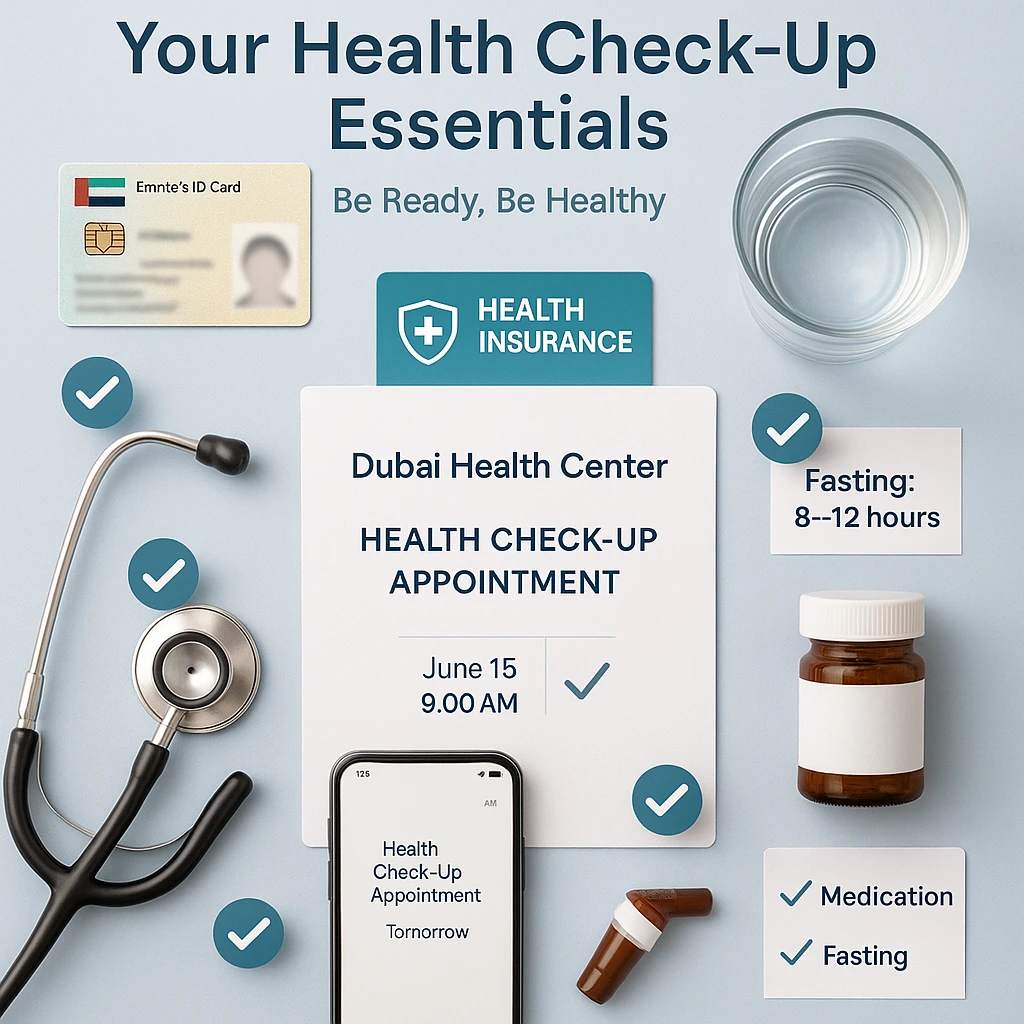
Fasting Requirements and Medication Guidelines
Certain health screenings, especially those measuring blood sugar, cholesterol, and lipid profiles, require fasting to ensure reliable results. To prepare effectively:
- Fasting Duration: Refrain from eating or drinking anything except plain water for 8 to 12 hours before your appointment, depending on the specific tests ordered.
- Medication Intake: Consult your doctor about any medications you are currently taking. Some drugs may interfere with blood test results and may need to be paused or adjusted.
- Water Intake: Staying hydrated with plain water during the fasting period is recommended to avoid dehydration and facilitate smoother blood draws.
Adhering to these fasting and medication guidelines helps ensure the accuracy and reliability of your screening results.
Essential Documents: Emirates ID and Insurance Cards
Bringing the correct documents is essential for a hassle-free registration process, seamless insurance verification, and linking your visit to the UAE’s national health record systems, such as Malaffi (Abu Dhabi) and Riayati (nationwide):
- Emirates ID: Mandatory for identity verification and integration with your electronic health record.
- Health Insurance Card: Required to process insurance claims for preventive screenings and diagnostic procedures.
- Doctor’s Referral (if applicable): Some insurance policies require a referral letter for specialist-recommended screenings or advanced diagnostics.
Preparing these documents in advance helps streamline your check-up experience and avoid unnecessary delays.
Post-Check-Up Follow-Up: Understanding Your Results
Following up after your check-up is essential for proactive health management and timely intervention:
- Result Review: Most UAE clinics provide digital access to reports via secure emails or patient portals linked to your Emirates ID.
- Doctor Consultation: Schedule a follow-up appointment to discuss your results, address any abnormal findings, and determine whether additional tests or treatments are needed.
- Preventive Action: Based on the outcomes, your doctor may recommend lifestyle modifications, prescribe necessary medications, or advise more frequent screenings to monitor emerging health risks.
By preparing thoughtfully and following through after your check-up, you contribute to more accurate results, better health outcomes, and align with the UAE’s national commitment to preventive healthcare and wellness.
Future Trends in UAE Preventive Healthcare
As the UAE advances its ambitious Vision 2031 goals, preventive healthcare is rapidly evolving from routine screenings to a dynamic, technology-driven system focused on early detection, personalized medicine, and population-wide wellness. National strategies led by entities like MOHAP, DHA, and DOH are transforming how residents approach health maintenance—emphasizing innovation, accessibility, and predictive care models. Below, we explore the key trends reshaping the future of preventive healthcare across the Emirates, from AI diagnostics and genomics to home-based health services and sustainable healthcare initiatives.
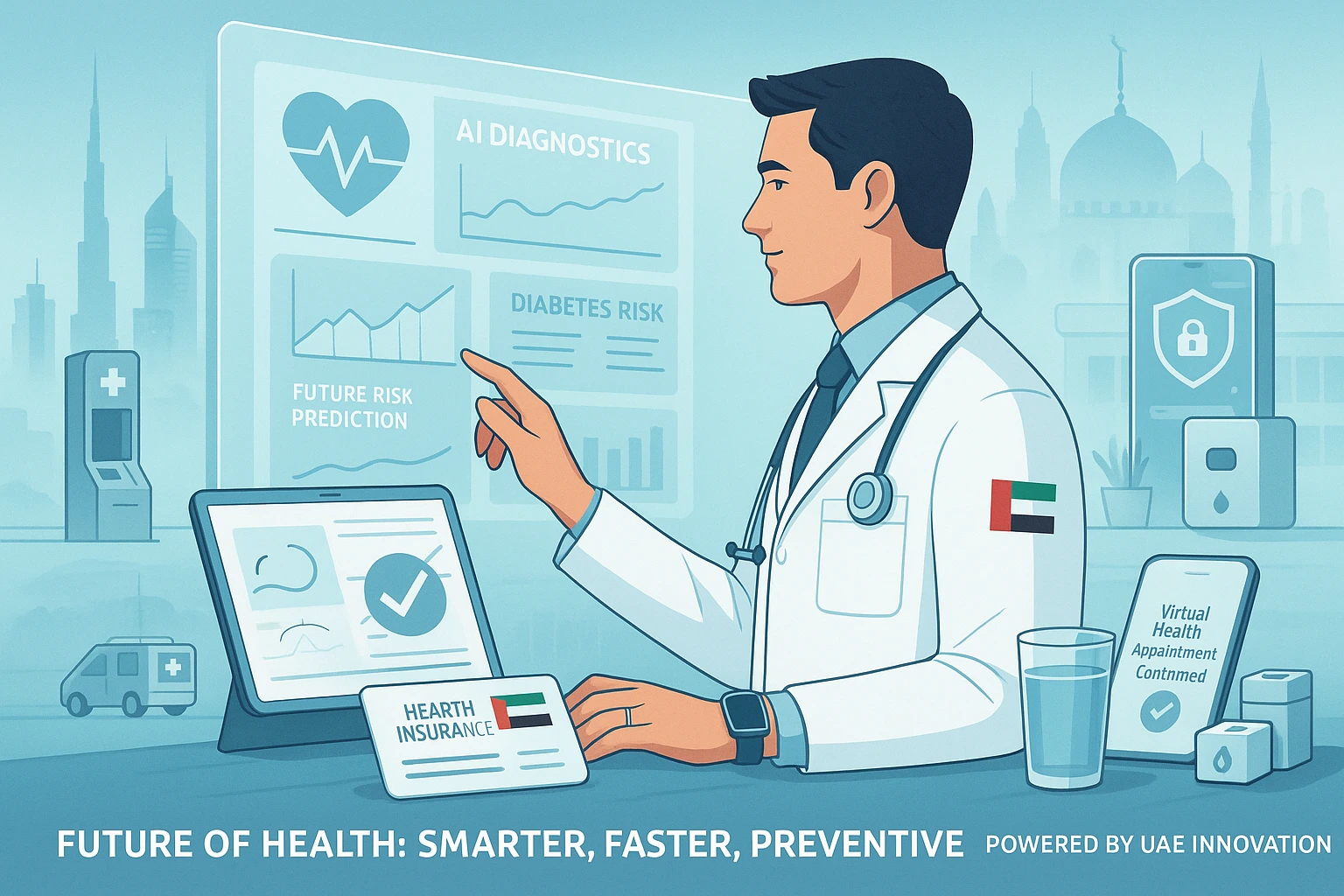
Rise of AI-Based Diagnostic Screening
Artificial intelligence (AI) is rapidly transforming preventive healthcare in the UAE, reshaping early detection and personalized health screening across the country. AI-driven diagnostic tools are becoming integral to mainstream clinical practice, enabling faster, more accurate, and highly individualized care.
Organizations such as the Dubai Health Authority (DHA) are pioneering the implementation of AI algorithms through initiatives like DHA Smart Clinics, which deliver quicker and more precise health screenings. SEHA hospitals have also integrated AI technologies to enhance mass screening accuracy and early disease identification.
The Ministry of Health and Prevention (MOHAP) strongly supports the adoption of AI-driven diagnostics across UAE healthcare facilities, aligning with national goals to elevate healthcare standards. As the UAE accelerates its journey toward Vision 2031—an initiative emphasizing world-class healthcare infrastructure—AI-based screening will play a critical role in advancing predictive analytics, identifying health risks before symptoms emerge, and enabling proactive, tailored preventive strategies.
Government Initiatives for Mass Health Screening Programs
Government-led mass screening programs will continue to drive the future of preventive healthcare in the UAE. Under the leadership of MOHAP and the Department of Health Abu Dhabi (DOH), large-scale preventive health campaigns are expanding across the Emirates.
MOHAP initiatives are launching new mass screening efforts focused on detecting chronic conditions such as hypertension, obesity, and diabetes early, ensuring timely intervention and better population health outcomes. The UAE government plans to significantly broaden the reach of these programs under the Vision 2031 roadmap, aiming to lower disease prevalence and promote long-term wellness.
Smart platforms like Malaffi and Riayati are pivotal to this expansion:
- Malaffi enables centralized health data sharing across Abu Dhabi.
- Riayati supports real-time, nationwide integration of electronic health records (EHRs).
Together, these systems will enhance the efficiency, coordination, and inclusiveness of mass screening programs, reinforcing the UAE’s commitment to data-driven, preventive healthcare models.
Home-Based Medical Testing and Remote Consultations
The shift toward home-based medical testing and remote consultations marks a significant trend in UAE preventive healthcare. Driven by the growing demand for convenience and technological innovation, residents can now access preventive services without visiting traditional clinics.
DHA actively promotes the use of home diagnostic kits and telemedicine platforms, making preventive care more accessible for busy urban populations and underserved rural areas alike. SEHA Virtual Services are expanding remote consultation offerings, allowing for real-time interaction between patients and healthcare providers for preventive screenings and health advice.
Remote consultations improve access to early interventions, empowering residents to manage their health proactively. As home-based medical testing becomes a mainstream option—supported by regulatory frameworks and strategic investments from UAE health authorities—the preventive care model will continue to evolve, delivering more seamless, on-demand, and personalized healthcare experiences.
Wearable Health Technology and Continuous Monitoring
Wearable health technologies such as smartwatches, biometric sensors, and connected medical devices are increasingly being adopted in the UAE. These tools provide real-time preventive monitoring for conditions like atrial fibrillation, hypertension, diabetes, and sleep disorders.
Initiatives like MOHAP’s Digital Health Strategy 2026 prioritize integrating wearable health data into national systems like Malaffi and Riayati, enabling clinicians to leverage continuous health data streams for early diagnosis and personalized interventions.
Wearable technology will become a key pillar of preventive healthcare, offering residents proactive tools to manage and mitigate health risks in real time.
Genomic Screening and Precision Prevention
The Emirati Genome Program is revolutionizing personalized preventive healthcare in the UAE. By decoding genetic profiles, healthcare providers can predict an individual’s susceptibility to diseases such as cancer, cardiovascular disorders, and rare genetic conditions.
Genomics enables ultra-personalized prevention strategies—offering tailored screening schedules, lifestyle recommendations, and early interventions based on genetic risk profiles. As genomic data becomes more integrated into UAE preventive healthcare, predictive and precision medicine will be cornerstones of the Vision 2031 strategy.
Preventive Vaccination Drives
Preventive vaccination campaigns remain central to the UAE’s national healthcare agenda. Led by MOHAP and SEHA, initiatives promoting immunizations against diseases such as HPV, influenza, pneumococcal infections, and COVID-19 variants are expanding.
Mandatory vaccination programs for schoolchildren, healthcare workers, and high-risk groups aim to protect public health and prevent outbreaks, solidifying vaccines as essential preventive healthcare measures under Vision 2031.
Mental Health Screening Integration
Mental health is gaining recognition as a core component of preventive healthcare in the UAE. Programs like the Abu Dhabi Mental Health Strategy and Dubai’s Happiness Agenda integrate mental health screenings into routine health evaluations.
Early identification of conditions like anxiety, depression, and stress-related disorders through preventive mental health check-ups ensures timely intervention and supports the UAE’s broader commitment to holistic, community-based well-being models.
Blockchain in Health Data Security
As data becomes central to preventive healthcare, ensuring its security is paramount. Blockchain technology pilots, such as those led by DHA’s Smart Dubai Health Program, aim to safeguard electronic health data with decentralized, tamper-proof systems.
Blockchain-based records enhance patient trust, ensure compliance with international data privacy standards, and streamline preventive healthcare delivery through secure, transparent information exchange.
Private Sector Innovations in Preventive Care
Private healthcare providers in the UAE—such as Mediclinic Middle East, NMC Healthcare, VPS Healthcare, and Aster DM Healthcare—are rapidly adopting advanced preventive technologies. From AI-based diagnostics to mobile health screening vans, private sector players are integral to expanding preventive healthcare access and innovation.
Collaborations between private entities and government bodies are accelerating the UAE’s transition to a preventive-first health model.
Green and Sustainable Preventive Healthcare Facilities
Sustainability is increasingly linked to healthcare innovation. Under Vision 2031, the UAE is promoting the development of eco-friendly healthcare facilities, including preventive clinics with:
- Paperless patient intake systems
- Solar-powered energy systems
- Waste reduction programs
Green preventive healthcare initiatives align environmental responsibility with health promotion, supporting the UAE’s dual goals of public health excellence and environmental stewardship.
Through strategic investments in AI, wearable technologies, genomic medicine, vaccination programs, blockchain security, and sustainable infrastructure, the UAE’s healthcare system is advancing toward a future where preventive care is smarter, faster, greener, and deeply integrated into everyday life. These trends directly align with the transformative ambitions outlined in UAE Vision 2031—positioning the country as a global leader in innovative, holistic, and proactive healthcare delivery.
FAQs for Health Check-Ups in the UAE
Dr. Aisha Rahman is a board-certified internal medicine specialist with over 12 years of clinical experience in chronic disease management and preventive healthcare. She has worked at leading hospitals across the UAE, helping patients manage conditions such as diabetes, hypertension, cardiovascular diseases, and metabolic disorders.
A strong advocate for preventive medicine, Dr. Rahman emphasizes early diagnosis, lifestyle modifications, and patient education to reduce chronic illness risks. She is an active member of the Emirates Medical Association and has contributed to health awareness programs and medical research initiatives. Her expertise has been featured in The National UAE, Gulf Health Magazine, and leading medical journals. As a keynote speaker at healthcare conferences, she shares insights on evidence-based treatments, patient-centered care, and advancements in internal medicine.


